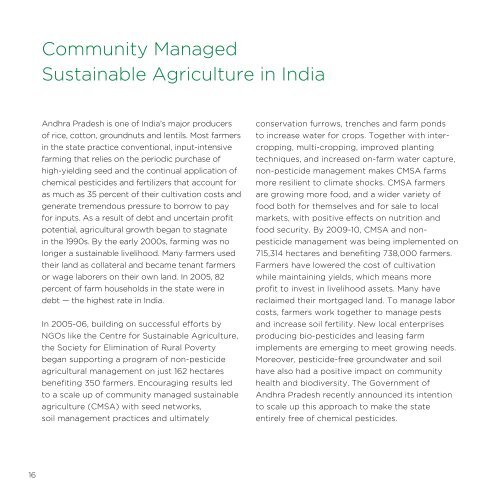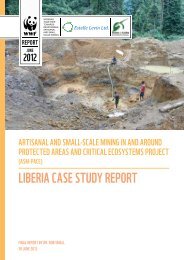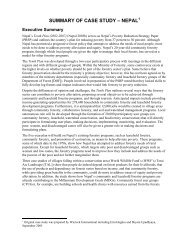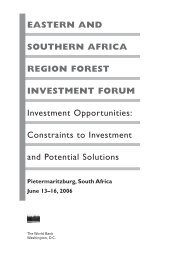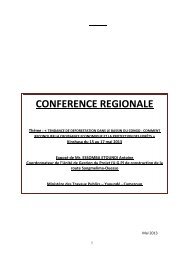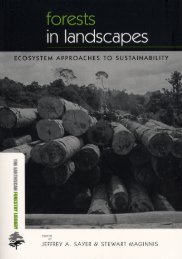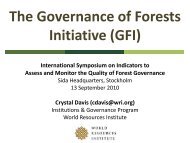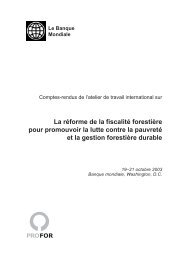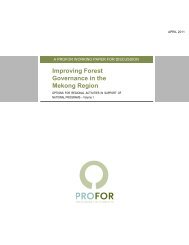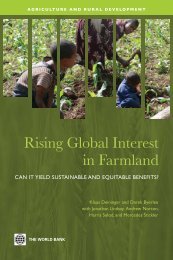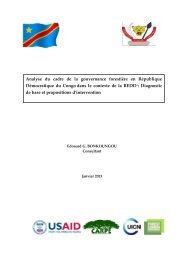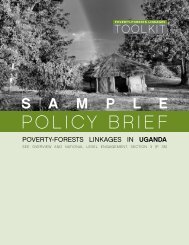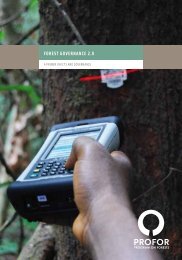Climate Smart Agriculture: A Call to Action - PROFOR
Climate Smart Agriculture: A Call to Action - PROFOR
Climate Smart Agriculture: A Call to Action - PROFOR
Create successful ePaper yourself
Turn your PDF publications into a flip-book with our unique Google optimized e-Paper software.
Community Managed<br />
Sustainable <strong>Agriculture</strong> in India<br />
Andhra Pradesh is one of India’s major producers<br />
of rice, cot<strong>to</strong>n, groundnuts and lentils. Most farmers<br />
in the state practice conventional, input-intensive<br />
farming that relies on the periodic purchase of<br />
high-yielding seed and the continual application of<br />
chemical pesticides and fertilizers that account for<br />
as much as 35 percent of their cultivation costs and<br />
generate tremendous pressure <strong>to</strong> borrow <strong>to</strong> pay<br />
for inputs. As a result of debt and uncertain profit<br />
potential, agricultural growth began <strong>to</strong> stagnate<br />
in the 1990s. By the early 2000s, farming was no<br />
longer a sustainable livelihood. Many farmers used<br />
their land as collateral and became tenant farmers<br />
or wage laborers on their own land. In 2005, 82<br />
percent of farm households in the state were in<br />
debt — the highest rate in India.<br />
In 2005-06, building on successful efforts by<br />
NGOs like the Centre for Sustainable <strong>Agriculture</strong>,<br />
the Society for Elimination of Rural Poverty<br />
began supporting a program of non-pesticide<br />
agricultural management on just 162 hectares<br />
benefiting 350 farmers. Encouraging results led<br />
<strong>to</strong> a scale up of community managed sustainable<br />
agriculture (CMSA) with seed networks,<br />
soil management practices and ultimately<br />
conservation furrows, trenches and farm ponds<br />
<strong>to</strong> increase water for crops. Together with intercropping,<br />
multi-cropping, improved planting<br />
techniques, and increased on-farm water capture,<br />
non-pesticide management makes CMSA farms<br />
more resilient <strong>to</strong> climate shocks. CMSA farmers<br />
are growing more food, and a wider variety of<br />
food both for themselves and for sale <strong>to</strong> local<br />
markets, with positive effects on nutrition and<br />
food security. By 2009-10, CMSA and nonpesticide<br />
management was being implemented on<br />
715,314 hectares and benefiting 738,000 farmers.<br />
Farmers have lowered the cost of cultivation<br />
while maintaining yields, which means more<br />
profit <strong>to</strong> invest in livelihood assets. Many have<br />
reclaimed their mortgaged land. To manage labor<br />
costs, farmers work <strong>to</strong>gether <strong>to</strong> manage pests<br />
and increase soil fertility. New local enterprises<br />
producing bio-pesticides and leasing farm<br />
implements are emerging <strong>to</strong> meet growing needs.<br />
Moreover, pesticide-free groundwater and soil<br />
have also had a positive impact on community<br />
health and biodiversity. The Government of<br />
Andhra Pradesh recently announced its intention<br />
<strong>to</strong> scale up this approach <strong>to</strong> make the state<br />
entirely free of chemical pesticides.<br />
16


